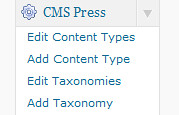This month, we bypass the concepts and big ideas of content marketing and dive into an important nuts-and-bolts question: how do you know which CMS (content management system) is right for you. On one hand, they’re all a huge step above the old days of static HTML sites. Those sites made it hard to update site content – that usually meant creating the content, editing the content, handing the content off to a techie and hoping that it worked as well on the site as it did in your mind’s eye – or you had to start the whole process over again. Those sites also made it very difficult to re-use your content in ways that are easy now, and are important to your website’s marketing effectiveness.
Here’s an example. If you’re like most marketers, you have an audience that consists of more than one segment. Perhaps your target market breaks down along industry lines, or their role within their organization, or the size of their organization.

So naturally, you’ll want to appeal to each of them with the content that matters most to each segment individually.
A well-developed CMS enables you to create this customization without having to build entire swaths of your website multiple times. You have the ability to create content elements that can be tagged and categorized in multiple ways. So while your landing page for “segment A” will be specific to that section of the site, you can have other pages of content within that section that can also be a part of sections for other audience segments.
Another great example of this is sidebar content. We frequently use sidebar content to help support the information in the page’s main content. Think case studies, white papers and other “knowledge center” items that relate to the main content. It’s not uncommon for those sidebar materials to relate to more than one category of content. When we tag them intelligently, we can re-use them, so we’re presenting them to the appropriate audience segments at their convenience. They don’t have to search for the content of interest to them in the knowledge center; we bring it to them where they’re already engaged.
In other words, you create the content once and use it many times.
Now, all of the major CMSes are capable of doing this right out of the box, so on this score the issue is less about the CMS itself and the skills and experience of the development team customizing it for you. Make sure you have some understanding of how you will use this important feature so you can explain how you feel your content should inter-relate.
But also be sure to have a close look at the CMS’ administrative tools. Ease of use is an often-overlooked predictor of a site’s success. If it’s easy for you and your team to maintain the site’s editorial content on a daily basis, you’ll do that maintenance. If not, your site will grow stale.
WordPress is usually the clear winner here, at least based on the feedback we’ve received from clients who have lived with WordPress, Drupal, Joomla, and ExpressionEngine, among others.
But don’t take our word for it – or anyone else’s, for that matter. Make sure you log in to a test site to see how the site’s back end works. Arm yourself with a list of tasks that you frequently tackle, and try to do the same things on the test site. Note what’s intuitive and what is not. Frequently, there are things that are not intuitive for very good reason, whether functional or budgetary, but you need to be sure you’re comfortable with how things work, and are informed enough to make intelligent budget decisions.
(For example, a gallery of images might be expensive to code in such a way that they’re easily editable within the back end and much less expensive to code so that changing them requires FTP uploads. If they’re going to change weekly, the up-front expense of coding saves you time and money in the long run. If they change only yearly, cheaper coding and the occasional call to someone who knows how FTP works is the better route.)
Don’t forget about the development community surrounding the CMS you’re considering. Is there a large community of developers actively engaged in keeping the CMS up to date with security patches and browser compatibility fixes? Are they developing new features to keep the system’s evolution moving along?
This is an important consideration not just because, obviously, security and browser compatibility are critical, but because the large development communities of the more popular CMSes give you more options in choosing partners to work with. (And whatever you do, steer clear of custom-coded proprietary tools unless you’re very comfortable being married to the original developer for the life of the site.)
So which CMS should you choose? Whichever best fits your needs. WordPress and Drupal work for a lot of people. Others love, love, love Joomla. Or ModX. Or … you get the picture. Be wary of developers who are intent on selling you on one CMS above all others, especially if they haven’t already asked you about your plans for the site and what it needs to accomplish for you. The last thing you want is a developer making decisions based on his needs rather than yours.




